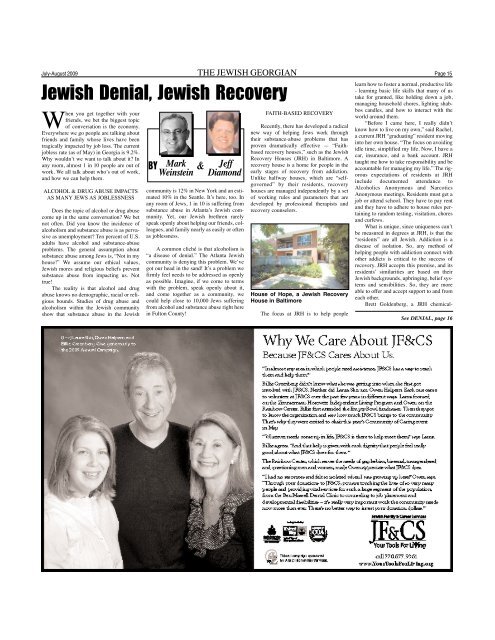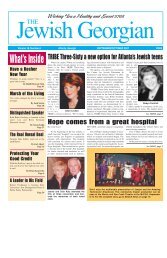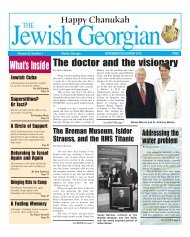JGA July-August 09 - The Jewish Georgian
JGA July-August 09 - The Jewish Georgian
JGA July-August 09 - The Jewish Georgian
You also want an ePaper? Increase the reach of your titles
YUMPU automatically turns print PDFs into web optimized ePapers that Google loves.
<strong>July</strong>-<strong>August</strong> 20<strong>09</strong> THE JEWISH GEORGIAN Page 15<br />
<strong>Jewish</strong> Denial, <strong>Jewish</strong> Recovery<br />
W<br />
hen you get together with your<br />
friends, we bet the biggest topic<br />
of conversation is the economy.<br />
Everywhere we go people are talking about<br />
friends and family whose lives have been<br />
tragically impacted by job loss. <strong>The</strong> current<br />
jobless rate (as of May) in Georgia is 9.2%.<br />
Why wouldn’t we want to talk about it? In<br />
any room, almost 1 in 10 people are out of<br />
work. We all talk about who’s out of work,<br />
and how we can help them.<br />
ALCOHOL & DRUG ABUSE IMPACTS<br />
AS MANY JEWS AS JOBLESSNESS<br />
Does the topic of alcohol or drug abuse<br />
come up in the same conversation? We bet<br />
not often. Did you know the incidence of<br />
alcoholism and substance abuse is as pervasive<br />
as unemployment? Ten percent of U.S.<br />
adults have alcohol and substance-abuse<br />
problems. <strong>The</strong> general assumption about<br />
substance abuse among Jews is, “Not in my<br />
house!” We assume our ethical values,<br />
<strong>Jewish</strong> mores and religious beliefs prevent<br />
substance abuse from impacting us. Not<br />
true!<br />
<strong>The</strong> reality is that alcohol and drug<br />
abuse knows no demographic, racial or religious<br />
bounds. Studies of drug abuse and<br />
alcoholism within the <strong>Jewish</strong> community<br />
show that substance abuse in the <strong>Jewish</strong><br />
BY Mark &<br />
Weinstein<br />
Jeff<br />
Diamond<br />
community is 12% in New York and an estimated<br />
10% in the Seattle. It’s here, too. In<br />
any room of Jews, 1 in 10 is suffering from<br />
substance abuse in Atlanta’s <strong>Jewish</strong> community.<br />
Yet, our <strong>Jewish</strong> brethren rarely<br />
speak openly about helping our friends, colleagues,<br />
and family nearly as easily or often<br />
as joblessness.<br />
A common cliché is that alcoholism is<br />
“a disease of denial.” <strong>The</strong> Atlanta <strong>Jewish</strong><br />
community is denying this problem. We’ve<br />
got our head in the sand! It’s a problem we<br />
firmly feel needs to be addressed as openly<br />
as possible. Imagine, if we come to terms<br />
with the problem, speak openly about it,<br />
and come together as a community, we<br />
could help close to 10,000 Jews suffering<br />
from alcohol and substance abuse right here<br />
in Fulton County!<br />
FAITH-BASED RECOVERY<br />
Recently, there has developed a radical<br />
new way of helping Jews work through<br />
their substance-abuse problems that has<br />
proven dramatically effective — “Faithbased<br />
recovery houses,” such as the <strong>Jewish</strong><br />
Recovery Houses (JRH) in Baltimore. A<br />
recovery house is a home for people in the<br />
early stages of recovery from addiction.<br />
Unlike halfway houses, which are “selfgoverned”<br />
by their residents, recovery<br />
houses are managed independently by a set<br />
of working rules and parameters that are<br />
developed by professional therapists and<br />
recovery counselors.<br />
House of Hope, a <strong>Jewish</strong> Recovery<br />
House in Baltimore<br />
<strong>The</strong> focus at JRH is to help people<br />
learn how to foster a normal, productive life<br />
- learning basic life skills that many of us<br />
take for granted, like holding down a job,<br />
managing household chores, lighting shabbos<br />
candles, and how to interact with the<br />
world around them.<br />
“Before I came here, I really didn’t<br />
know how to live on my own,” said Rachel,<br />
a current JRH “graduating” resident moving<br />
into her own house. “<strong>The</strong> focus on avoiding<br />
idle time, simplified my life. Now, I have a<br />
car, insurance, and a bank account. JRH<br />
taught me how to take responsibility and be<br />
accountable for managing my life.” <strong>The</strong> rigorous<br />
expectations of residents at JRH<br />
include documented attendance to<br />
Alcoholics Anonymous and Narcotics<br />
Anonymous meetings. Residents must get a<br />
job or attend school. <strong>The</strong>y have to pay rent<br />
and they have to adhere to house rules pertaining<br />
to random testing, visitation, chores<br />
and curfews.<br />
What is unique, since uniqueness can’t<br />
be measured in degrees at JRH, is that the<br />
“residents” are all <strong>Jewish</strong>. Addiction is a<br />
disease of isolation. So, any method of<br />
helping people with addiction connect with<br />
other addicts is critical to the success of<br />
recovery. JRH accepts this premise, and its<br />
residents’ similarities are based on their<br />
<strong>Jewish</strong> backgrounds, upbringing, belief systems<br />
and sensibilities. So, they are more<br />
able to offer and accept support to and from<br />
each other.<br />
Brett Goldenberg, a JRH chemical-<br />
See DENIAL, page 16
















